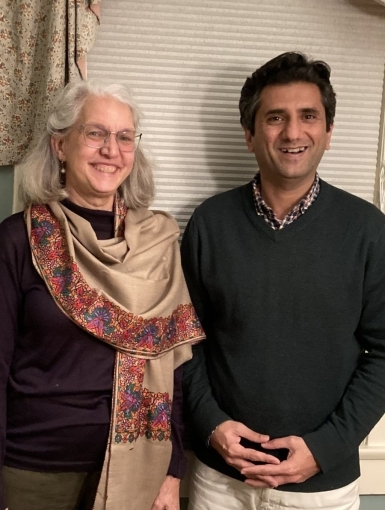
Nasir Mehmood joined the Center for International and Security Studies at Maryland (CISSM) at the School of Public Policy as a visiting scholar in January. His current research examines the political-diplomatic and military-strategic effects of existing bilateral behavioral arms control measures on India-Pakistan relations. Mehmood is an assistant professor at the Strategic Studies Department at National Defence University, Pakistan. He also served as an assistant director (academics) at the Foreign Service Academy, Ministry of Foreign Affairs, Pakistan. In 2021, he was a visiting international fellow at the James Martin Center for Non-proliferation Studies.
Tell us about your educational and professional background.
My parents were unlettered. They never went to school, yet were determined that their children must get an excellent education from outstanding institutions, not only in Pakistan but also internationally. My journey has been influenced and impacted not only by challenges, but also by a clear sense of purpose as well.
I earned my master’s in defense and strategic studies at one of the leading universities in Pakistan. Then, I got an opportunity to serve as an Assistant Director of Academics at the Foreign Service Academy, the training arm of the Ministry of Foreign Affairs in Pakistan. After one and a half years, I got to join a bigger, more vibrant, and intellectually stimulating institution, the National Defense University of Pakistan. I joined it as a civilian in an academic position in the Department of Strategic Studies. After serving there for about three years, towards the end of 2014, I was lucky enough to get a PhD position in the Department of Politics and International Relations, University of Reading, in the UK. At that time, the University of Reading was known as the best place to study strategy.
In 2020, after my PhD, I came back to the National Defense University as an Assistant Professor. In 2022, I was elevated as chair of the department, and then in January 2024, I got a one-year leave from my department and came to CISSM, a world-class institution of security studies.
What attracted you to come to CISSM?
I selected CISSM primarily because I would have the opportunity to work closely with my research mentor, Nancy Gallagher. She is internationally renowned for her expertise in arms control and international security. Additionally, CISSM's global standing as a premier education and research institution and its world-class affiliated faculty further solidified my decision.
What have you learned and accomplished during your time at CISSM?
CISSM offered me everything I could imagine to advance my academic and professional career. Nancy Gallagher helped me to settle down very quickly. Francesca Perry was a great help in sorting out documentation. Everyone at CISSM was very welcoming and warm.
Nancy Gallagher helped me with the meaning-making of arms control in international security. She mentored me on how to think, organize, and conduct policy-oriented research. I must say that she pushed my research to the interface of theory and policy.
I was able to audit Nancy Gallagher's and Steve Fetter's courses. These courses expanded my knowledge base and exposed me to new pedagogical skills. Similarly, the CISSM forum was another regular source of learning and professional networking. CISSM also facilitated my attending of relevant and important academic events and conferences in Washington, D.C.
My year at CISSM has also been very rewarding in terms of research. My primary project is an assessment of the 1988 India-Pakistan agreement prohibiting attacks against each other's nuclear installations/facilities. Russia’s full-scale invasion of Ukraine is the first time that hostile military operations have occurred in and around nuclear power plants. Some security experts propose the India-Pakistan agreement as a model Russia and Ukraine could use to reduce nuclear risks, while others have claimed that the agreement is purely symbolic or even destabilizing. My research shows that the terms and implementation of the India-Pakistan agreement have been carefully crafted to provide meaningful reassurance without weakening deterrence. It recommends two supplementary measures to augment the agreement's efficacy: establishing a Bilateral Consultative Commission and extending the ban to include cyber-attacks. I presented this project at a CISSM forum in September and will be publishing it as a CISSM working paper.
Owing to the high-class mentorship and conducive environment at CISSM, I have finished a number of other publications. People at CISSM have been very generous about sharing feedback and giving input on my research. My work on the dynamics and value of the Pakistan-US geopolitical relationship was published in Orbis. I contributed a chapter on how arms control measures can help reinforce the liberal status of India and Pakistan's Exclusive Economic Zones to The Future of Borders and Geopolitics in South Asia. I wrote a commentary for the Stimson Center’s South Asian Voices on why India and Pakistan need to establish a bilateral consultative body for their bilateral arms control system. I contributed two articles to leading Pakistani journals, one on the 2024 Iran-Pakistan aerial confrontation crisis and the other on the Russian battlefield strategy in Ukraine. I also have two manuscripts being peer-reviewed by international journals. One article examines the value of procedural arms control in preventing accidental/inadvertent missile launches between India and Pakistan. The other focuses on the intelligence aspect in the post-conflict reconstruction efforts.
Tell us about your plans and any meaningful takeaways.
My future research plans involve continuing research on the evolving dynamics of strategic theory and diplomacy in Southern Asia. I am committed to enhancing understanding and intelligent management of threats and use of force, particularly limits to their political utility, to make a better world to live in. I eventually want to be a scholar of strategic theory and diplomacy who can exercise his judgment in the practical conduct of strategy and policy.
I believe India and Pakistan need to leverage the existing foundation and experience to optimize the utility of arms control as a cost-effective instrument of stability and security. Arms control becomes even more important when the power gap between the two rivals increases quickly. A stronger India with hyper-nationalist Hindu ideology, out of its arrogance and overconfidence, and a weaker Pakistan, out of its insecurity and anxiety, may end up in rapid escalations. India and Pakistan can manage their strategic and military contestation through practical arms control measures while pursuing divergent political goals. A strategy of prudence and reassurance should be an essential component of regional peace and stability. Moreover, India should respond positively to Pakistan’s overtures for a broader security dialogue to resolve all outstanding bilateral issues, including Jammu and Kashmir, and create a just regional security order.
I will bring back all of my learnings, experiences, and exposures and share them with colleagues and students in Pakistan. I also aim to build future academic and research collaborations between the School of Public Policy, the University of Maryland, and the Department of Strategic Studies, National Defence University, Pakistan.





